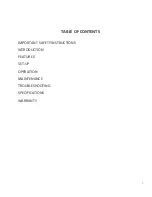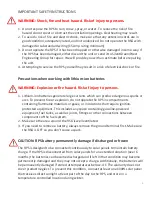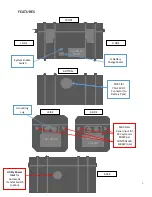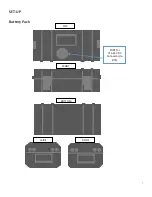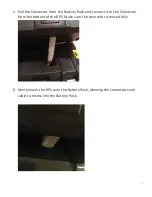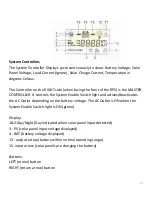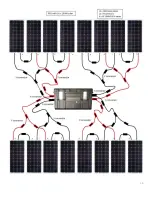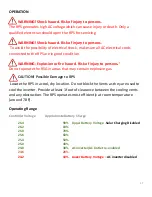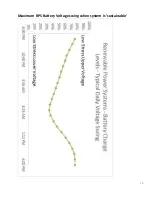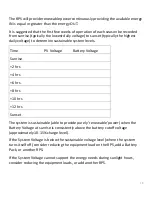
4
IMPORTANT SAFETY INSTRUCTIONS
WARNING: Shock, fire and heat hazard. Risk of injury to persons.
1.
Do not expose the RPS to rain, snow, spray, or water. To reduce the risk of fire
hazard do not cover or obstruct the ventilation openings. Overheating may result.
2.
To avoid a risk of fire and electric shock, make sure that any extension cords are in
good condition, adequately rated, and not undersized. Do not operate the RSG with
damaged or substandard wiring (15 Amp rating minimum).
3.
Do not operate the RPS if it has been dropped or otherwise damaged in some way. If
the RPS has been damaged, either discard the unit or send it to SilentGreen/West
Engineering Group for repair. We will provide you with an estimate before repairing
the unit.
4.
Attempting to service the RPS yourself may result in a risk of electrical shock or fire.
Precautions when working with lithium-ion batteries
WARNING: Explosion or fire hazard. Risk of injury to persons.
1.
Lithium-ion batteries generate large currents which can produce dangerous sparks or
arcs. To prevent fire or explosion, do not operate the RPS in compartments
containing flammable materials or gases, or in locations that require ignition-
protected equipment. This includes any space containing gasoline-powered
equipment, fuel tanks, as well as joints, fittings or other connections between
components of the fuel system.
2.
Make sure the area around the RSG is well ventilated.
3.
If you need to remove a battery, always remove the ground terminal first. Make sure
the RSG is OFF so you don’t cause a spark.
CAUTION: RPS battery permanently damage if discharged or frozen
The RPS is designed to be connected continuously to solar panels to maintain battery
charge. If the RPS is disconnected from solar panels for an extended duration (over 6
months) the batteries can become discharged and if left in that condition may become
permanently damaged and they may not accept a charge. Additionally, the batteries will
be permanently damaged if stored at temperatures below -4 F. The warranty does not
cover product neglect. To prevent this condition, connect at least one 100W solar panel
that receives direct sunlight at least part of the day to the RPS, and store in a
temperature controlled location during winter.
Summary of Contents for RPS
Page 14: ...14 ...
Page 15: ...15 ...
Page 16: ...16 ...
Page 18: ...18 Maximum RPS Battery Voltage swing when system is sustainable ...



